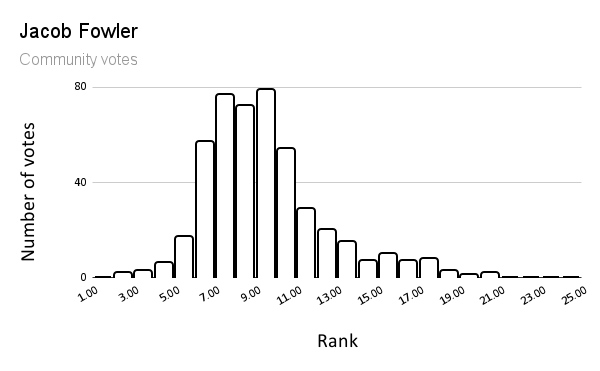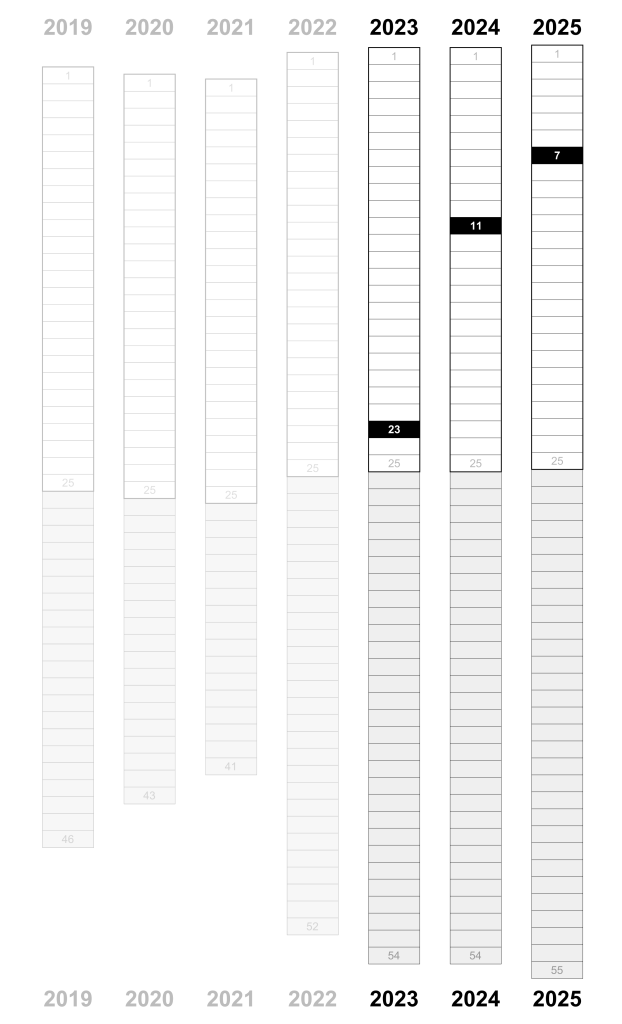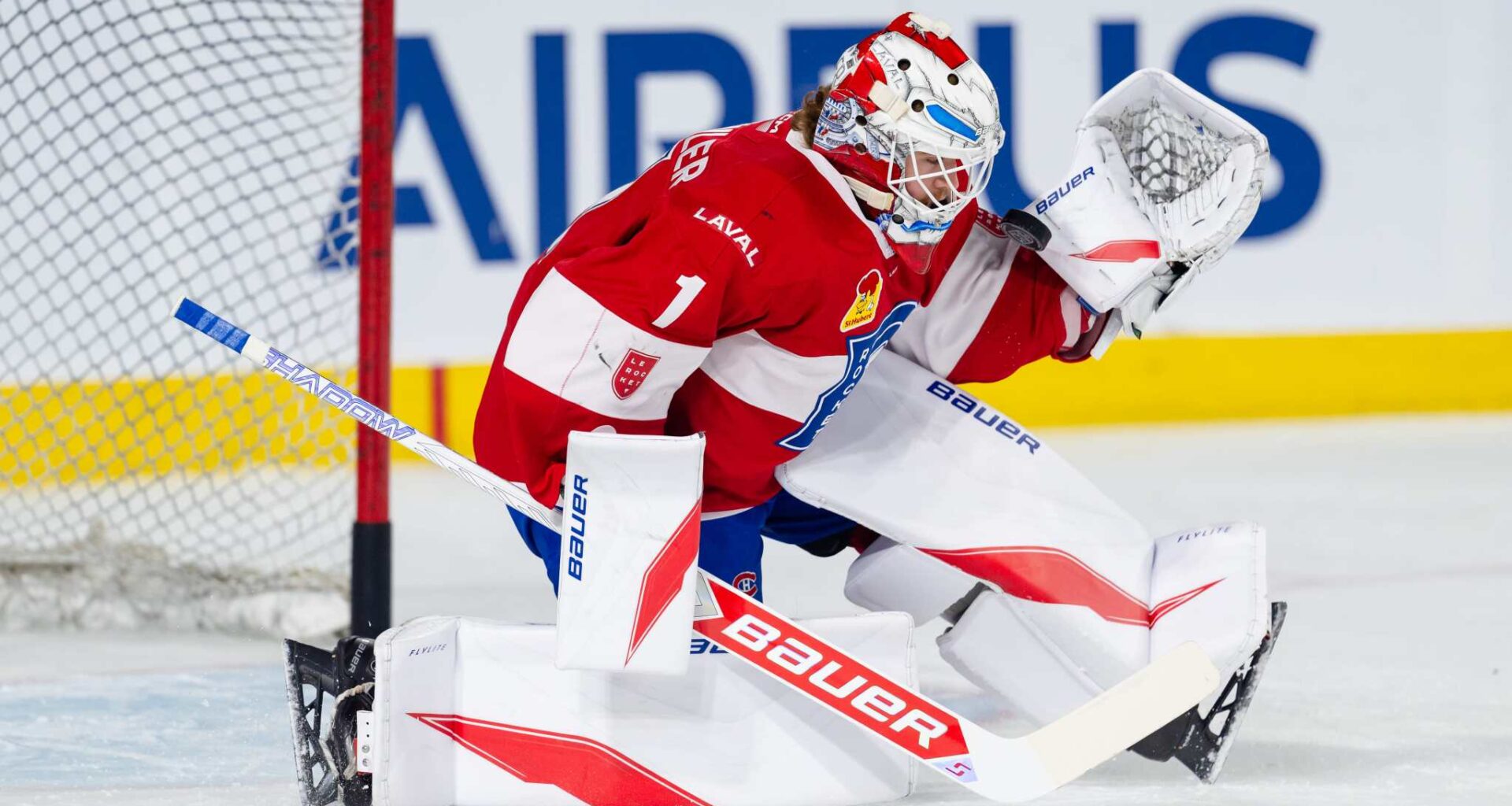Introduction
Jacob Fowler finished his last season at Boston College as the top goaltender in the NCAA, claiming the Mike Richter Award. He ended up playing 35 games, doing even better than his excellent freshman season. He had a 1.63 goals-against average and a .940 save percentage.
Once BC was eliminated in the NCAA tournament, he began his professional career in the AHL, playing three regular-season games to get a taste of professional hockey ahead of the Laval Rocket starting their playoff run.
The playoffs were clearly a step above what Fowler had seen up to that point of his career, but for a rookie goaltender to come in and play in that environment and still be useful to the Rocket was a positive in itself. He was in net for all three wins during the Rocket’s opening round versus the Cleveland Monsters. He didn’t claim another victory in the next two series, with the more experienced Cayden Primeau taking the main starting duties. Fowler did decently well in limited duty during the conference final against the Charlotte Checkers, allowing five goals in three appearances and being in net for the closest game of the series, a 3-2 Charlotte win in Game 4 that ended Laval’s season.
Fowler experienced what it’s like to play in the AHL and will not only have a better idea of how to prepare himself for a full professional year but won’t be thrown into such high-leverage situations right from the outset. He can ramp up his play with the team from the start of the season and slowly get accustomed to the pace of the game.
Voting

Everyone had Fowler within their top 10, with three placements at 10th and one as high as fourth. I was one of the early believers in Fowler back in 2023, but even though I still firmly believe in his potential to be a starter in the NHL, I recognize that goalie development is always harder to project and there are a lot of skaters in the system who have a more confident projection as impactful NHL players.

The community vote was quite similar to our panel vote, with a very large percentage of members having him in the range from seventh to ninth, though there remains a significant group that isn’t ready to give him such a high spot.
Top 25 Under 25 History

After rising 12 spots for last year’s countdown, Fowler advances another four places in 2025 after a stellar final collegiate season and promising start in Laval. Given the strength of the players we’ve yet to profile this year, it will take a big 2025-26 for him to continue this upward trend.
History of #7
Year
#7
2025
Jacob Fowler
2024
David Reinbacher
2023
David Reinbacher
2022
Joshua Roy
2021
Cayden Primeau
2020
Victor Mete
2019
Cole Caufield
2018
Ryan Poehling
2017
Scherbak/Juulsen (T-7)
2016
Daniel Carr
2015
Zack Kassian
2014
Jacob de la Rose
2013
Jarred Tinordi
2012
Brendan Gallagher
2011
Danny Kristo
2010
Max Pacioretty
Strengths
Fowler isn’t the flashiest goaltender out there but he has a strong foundation. He is more of a jack-of-all-trades type of goalie. His time in the NCAA allowed him to showcase his mental fortitude, his all-around strong game, and his great technique.
The Canadiens have often drafted athletic goaltenders and hoped that they could add the technical aspects needed to become NHLers. Fowler is not of that mould, and has therefore had to become fundamentally sound at an earlier age to find success. He is still fairly quick in his lateral movements, but his rebound control is a strength that rarely sees him give up second chances to opposing shooters that requires a swift recovery.
He’s a classic butterfly goaltender who rarely gets beat down low, preferring to use his 6’2″ frame and technique to stop his opponents. He does an excellent job of widening his stance in the crouch when facing a high-danger threat. He’s quick with his pads and can slam the door shut by shifting over with his pads.
Weaknesses
The two main weaknesses he had when he was drafted were his conditioning and mobility. He has worked tirelessly to minimize the impacts those have on his ability to play the position. While playing in the NCAA, he worked hard to change people’s perception about his fitness, with dietary improvements chief among the changes he made. He may have simply not been as physically mature as his peers as a draft-eligible, which is an acceptable state for a goaltender looking at a long development period. A good balance between training and more games at the professional level should help with any fitness issues.
His technique is solid and, as his top goaltender award attests, good enough to get the better of NCAA shooters. We did see him have some issues with reacting to the pace of play when up against Charlotte’s bubble NHLers in the AHL playoffs, so there is still work to do on his mobility and reaction speed to stay in the play longer.
Projection
As I said, projection is always difficult with goaltenders. Yet Fowler has proven to be a winner, a gamer, and a true student of the game. His transition to the AHL level has been pretty good, with the occasional hiccup here and there. That is all to be expected coming in late in the year and getting dropped right into the playoffs of a pro league.
With Jakub Dobeš and Kaapo Kähkönen set to battle for the backup spot in Montreal at training camp, Fowler should be able to focus on the AHL. His track record shows he’s been able to thrive at every level he’s played, and I believe the AHL will also serve him well in that regard.
With a full summer of training, he will have a new goal in mind. The aim is to establish himself as the new number-one goalie for the Rocket, gaining the necessary experience on his climb toward the dream of being a starter in the NHL.

